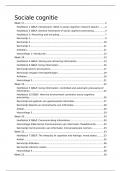Samenvatting
Volledige samenvatting Sociale Cognitie ()
Deze samenvatting bevat alle kennis die nodig is voor het tentamen van Sociale Cognitie, namelijk aantekeningen bij de kennisclips, de colleges, de artikelen en het boek Social Cognition geschreven door Greifeneder et al. (2018).
[Meer zien]





